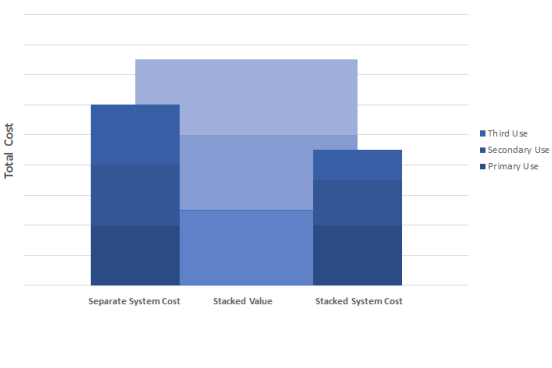Bridge fuel or foundation fuel?
The long-term future of natural gas debated at the World Gas Conference
Viewing entries in
Thought Leadership
Bridge fuel or foundation fuel?
The long-term future of natural gas debated at the World Gas Conference
Bill Kemp of Enovation Partners presents at WGC2018
Gas: Bridge Fuel or Long-Term Strategy
Commercial and Industrial (C&I) energy intensity has declined for a decade
Is residential electric demand next?
The Lazard annual report on the Levelized Cost of Storage LCOS 3.0 was released today with the Lazard Levelized Cost of Energy report LCOE 11.0
– LCOE 11.0 shows continued cost declines for utility-scale wind and solar energy –
– LCOS 3.0 shows declining but widely variable battery storage costs –
NEW YORK, November 2, 2017 – Lazard Ltd (NYSE: LAZ) has released its annual in-depth analyses comparing the costs of energy from various generation technologies and of energy storage technologies for different applications.
Lazard’s latest annual Levelized Cost of Energy Analysis (LCOE 11.0) shows a continued decline in the cost of generating electricity from alternative energy technologies, especially utility-scale solar and wind. Lazard’s latest annual Levelized Cost of Storage Analysis (LCOS 3.0), conducted with support from Enovation Partners, shows declining cost trends among commercially deployed technologies such as lithium-ion, but with wide variations depending on the type of application and battery technology.
“The growing cost-competitiveness of certain alternative energy technologies globally reflects a number of factors, including lower financing costs, declining capital expenditures per project, improving competencies and increased Industry competition,” said George Bilicic, Vice Chairman and Global Head of Lazard’s Power, Energy & Infrastructure Group.
“That said, developed economies will require diverse generation fleets to meet baseload generation needs for the foreseeable future.” “Energy industry participants remain confident in the future of renewables, with new alternative energy projects generating electricity at costs that are now at or below the marginal costs of some conventional generation,” said Jonathan Mir, Head of Lazard’s North American Power Group. “The next frontier is energy storage, where continued innovation and declining costs are expected to drive increased deployment of renewables, which in turn will create more demand for storage.”
The two studies offer a variety of insights, including the following selected highlights:
Lazard’s Global Power, Energy & Infrastructure Group serves private and public sector clients with advisory services regarding M&A, financing and other strategic matters. The group is active in all areas of 3 the traditional and alternative energy industries, including regulated utilities, independent power producers, alternative energy and infrastructure.
About Lazard
Lazard, one of the world's preeminent financial advisory and asset management firms, operates from 43 cities across 27 countries in North America, Europe, Asia, Australia, Central and South America. With origins dating to 1848, the firm provides advice on mergers and acquisitions, strategic matters, restructuring and capital structure, capital raising and corporate finance, as well as asset management services to corporations, partnerships, institutions, governments and individuals.
For more information on Lazard, please visit www.lazard.com. Follow us at @Lazard.
Link to source: Lazard Press Release for LCOS 3.0
Industry leading analytical comparison of energy storage costs
Stacked use cases capture multiple sources of value from a single installation. The total of all the potential value streams available for a given system defines the maximum, economically viable cost of the system; therefore, stacking value streams and use cases offer the greatest opportunity to maximize return.
Use cases focus on the user’s needs rather than the storage system, so by stacking all of the use cases into one stacked use case, a single system can be installed to perform all of the necessary actions. Having a single storage system that can cover all of the requirements in each unique circumstance is both easier to manage and install and also more cost efficient in the long run.

Stacked use case: commercial and industrial → The graphic visually shows the example of the stacked use case along with economies of scale, compared to cumulative system cost.
You get the same value of each use case and of the system as a whole for a portion of the cost (seen in picture).
by Grace Kelly
Dan Gabaldon's article in Power Engineering Magazine. The considerations necessary to evaluate new industrial energy storage
Lazard's LCOS 2.0 has been released. Enovation Partners collaborated with Lazard on the methodology and analysis.
DEFG and Enovation Partners Customer Surveys Point to Significant Impacts of Residential Solar on Utility Customer Service Strategy and Operations